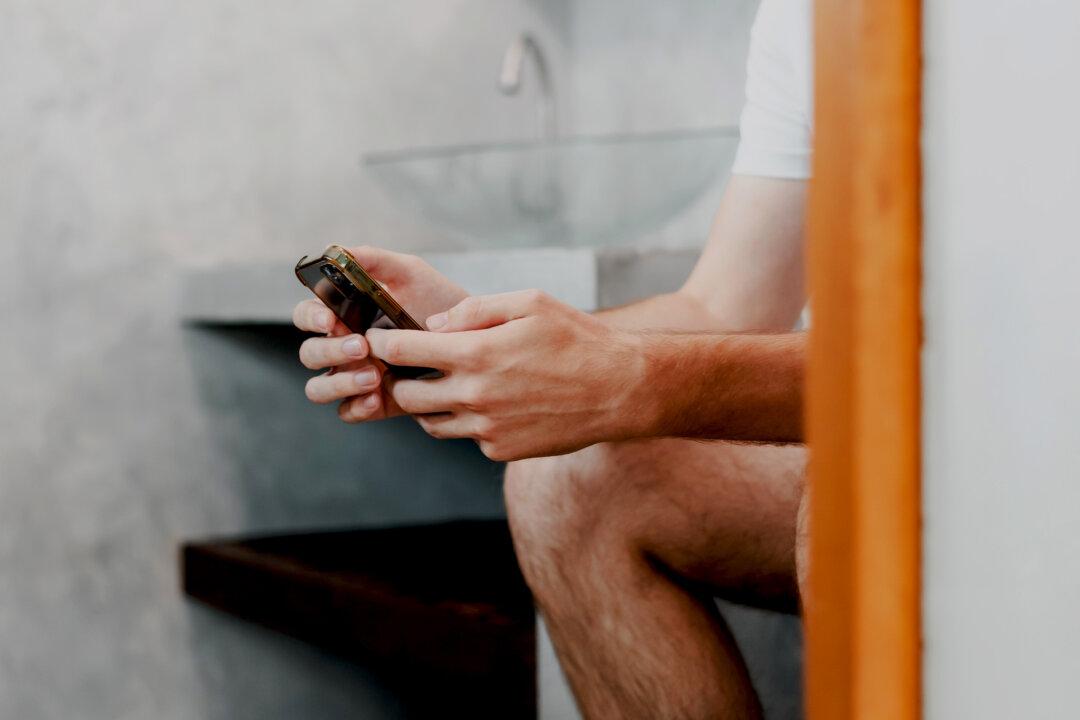 |
| Butsaya/Shutterstock |
Gastroenterologists explain why we should limit bathroom visits to five minutes.
The toilet has traditionally served as a quiet refuge for catching up on light reading and, for busy people, an opportunity for some “me time.”
However, this time-honored habit has been linked to a bowel condition as people transition from reading newspapers to scrolling on smartphones, a new study suggests.
Researchers have quantified what gastroenterologists have been warning patients about for years: Prolonged toilet sitting from smartphone use increases hemorrhoid risk, with new data showing phone users face nearly 50 percent increased risk of developing the painful condition.
“It’s a reminder that our daily habits, even something as simple as scrolling on the toilet, can have real health effects,” Dr. Bianca Islam, clinical instructor in the Division of Gastroenterology and Hepatology at Case Western Reserve University, who was not involved in the study, told The Epoch Times.
The Physics Behind the Problem
Longer toilet time associated with phone use creates the perfect conditions for hemorrhoid development. Unlike sitting in a chair, sitting on a toilet leaves the pelvic floor unsupported, putting increased pressure on rectal veins, Islam said.
“The physics of prolonged pressure on the rectal veins, combined with increased blood flow from this position, increases the risk of developing swollen and engorged rectal veins, also known as hemorrhoids,” Dr. Cynthia Tsay, spokesperson with the American Gastroenterological Association, who was not involved in the research, told The Epoch Times.
The study found that 37 percent of smartphone users spent more than five minutes on the toilet, compared to just 7 percent of non-users. The most common phone activities were reading news and browsing social media.
The study, recently published in the journal PLOS One, examined 125 adults undergoing screening colonoscopies. Participants answered online surveys about their lifestyle and toilet habits. Doctors then checked the participants for hemorrhoids.
Out of all the respondents, 66 percent reported using a smartphone on the toilet, and of those, 46 percent had a higher risk of hemorrhoids than those who did not.
“Clinically, I often see a link between patients who spend more time in the bathroom and hemorrhoid development,” Islam said.
“Historically, people blamed reading the newspaper on the toilet—today, it’s smartphones,” she added. “The data now reinforce what we’ve observed in practice for years.”
Interestingly, the study found that straining while on the toilet was not linked to increased hemorrhoid risk, which contrasts with some earlier research.
Breaking the Habit
The researchers recommended that people leave their smartphones outside the bathroom and try to spend only a few minutes on the toilet.
“If it’s taking longer, ask yourself why. Was it because having a bowel movement was really so difficult, or was it because my focus was elsewhere?” senior study author Dr. Trisha Pasricha told The Epoch Times.
Smartphones can make a person overstay their time in the bathroom, Tsay said, adding that many apps are designed to keep users distracted, which can lead to longer toilet times.
Tsay recommends we get off the toilet after five minutes if we’re unable to have a bowel movement in that time.
Other ways to reduce our risk for the painful condition include keeping stools soft and minimizing constipation through a combination of adequate fiber intake, drinking water, and regular physical activity, she said.
Avoid straining and pushing when having a bowel movement, Tsay added, and emphasized the need to minimize excessive sedentary time and standing, “especially on harder surfaces.”
“My advice to patients is to keep bathroom visits short and focus on healthy bowel habits overall,” she said.
Important Notice: This article was originally published at www.theepochtimes.com by George Citroner where all credits are due.
Disclaimer
The watching, interacting, and participation of any kind with anything on this page does not constitute or initiate a doctor-patient relationship with Veripeudic.com. None of the statements here have been evaluated by the Food and Drug Administration (FDA). The products of Veripeudic.com are not intended to diagnose, treat, cure, or prevent any disease. The information being provided should only be considered for education and entertainment purposes only. If you feel that anything you see or hear may be of value to you on this page or on any other medium of any kind associated with, showing, or quoting anything relating to Veripeudic.com in any way at any time, you are encouraged to and agree to consult with a licensed healthcare professional in your area to discuss it. If you feel that you’re having a healthcare emergency, seek medical attention immediately. The views expressed here are simply either the views and opinions of Veripeudic.com or others appearing and are protected under the first amendment.
Veripeudic.com promotes evidence-based natural approaches to health, which means integrating her individual scientific and clinical expertise with the best available external clinical evidence from systematic research. By individual clinical expertise, I refer to the proficiency and judgment that individual clinicians acquire through clinical experience and clinical practice.
Veripeudic.com does not make any representation or warranties with respect to the accuracy, applicability, fitness, or completeness of any multimedia content provided. Veripeudic.com does not warrant the performance, effectiveness, or applicability of any sites listed, linked, or referenced to, in, or by any multimedia content.
To be clear, the multimedia content is not intended to be a substitute for professional medical advice, diagnosis, or treatment. Always seek the advice of your physician or other qualified health providers with any questions you may have regarding a medical condition. Never disregard professional medical advice or delay in seeking it because of something you have read or seen in any website, video, image, or media of any kind. Veripeudic.com hereby disclaims any and all liability to any party for any direct, indirect, implied, punitive, special, incidental, or other consequential damages arising directly or indirectly from any use of the content, which is provided as is, and without warranties.

